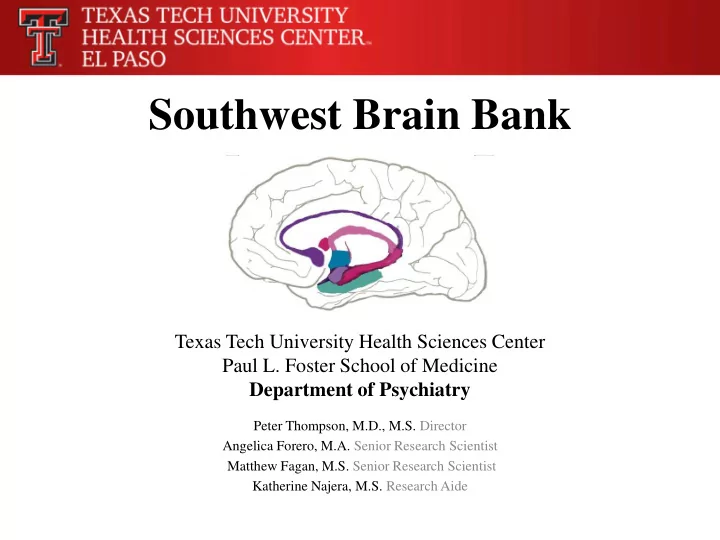

Southwest Brain Bank Texas Tech University Health Sciences Center Paul L. Foster School of Medicine Department of Psychiatry Peter Thompson, M.D., M.S. Director Angelica Forero, M.A. Senior Research Scientist Matthew Fagan, M.S. Senior Research Scientist Katherine Najera, M.S. Research Aide
The Southwest Brain Bank occupies lab space in the Medical Sciences Building at TTUHSC El Paso, Paul L. Foster School of Medicine. We also have a -80 C freezer room, and a separate space for the dissection and processing of donated tissue.
Regulation State of Texas Anatomical Review Board • Health and Safety Code Title 8. Death and Disposition of the Body. Subtitle B. Disposition of the Body Chapter 691. Anatomical Board of the State of Texas. • Subchapter B. Donation and Distribution of Bodies and Anatomical Specimens. • 691.022. General duties. (a) The board shall distribute bodies and anatomical specimens to institutions authorized to receive them. TTUHSC El Paso-Institutional Review Board • NOK Interview: Protocol # E16046. • Longitudinal Study: Protocol # E16046.
Tissue Collection Programs • Mental Illness Brain Bank: schizophrenia, depression, bipolar disorder, Post Traumatic Stress Disorder (PTSD), suicide, alcohol abuse. Normal controls are also collected. • Longitudinal Donor Program: Individuals can enroll in this program to donate their brain to the SWBB after death.
Tissue Collection Sites • Bexar County Medical Examiner’s Office (Dr. Frost) • El Paso County Medical Examiner’s Office (Dr. Rascon)
Focus of Research • Bipolar Disorder • Post Traumatic Stress Disorder (PTSD) • Suicide • Schizophrenia • Depression • Alcoholism • Drug Addiction • Frontotemporal Lobar Degeneration (Dementia)
Inclusion/Exclusion Criteria Inclusion Criteria: Exclusion Criteria: • History of seizures. • Mental Illness. (childhood febrile and alcohol withdrawal (Depression, Bipolar, Suicide, PTSD) case by case) • Normal Controls. • On ventilator >24 hrs. • Postmortem Interval <48 hrs. • Contagious bacterial or viral infection. • Age <85 yrs. (Hep A, C; meningitis; HIV; SARS; etc.) • Next-of-kin (NOK) consents to • Brain hemorrhage, infarcts, tumors. donation and interview. • Decomposed. • Medical Examiner releases brain. • Sepsis.
Tissue is extracted at on-site and, for locations outside of El Paso, packed and shipped to our lab. Donations are shipped by the quickest possible route and arrive at the lab the same day. The shipping materials include a watertight container, ice packs, watertight bags, and collection tubes for additional blood and cerebrospinal fluid (CSF). Once received, the tissue is processed immediately for storage.
Whole Brain Dorsal View Ventral View
Bisected Brain Lateral View Medial View
Cut Brain Sections - Cerebrum After bisecting the brain, it is cut front to back (coronally) into 1cm thick blocks Frontal Blocks 1-3
Cut Brain Sections - Cerebrum Frontal-Parietal-Temporal Blocks 4-7
Cut Brain Sections - Cerebrum Parietal-Occipital Blocks 8-12
Cut Brain Sections - Cerebellum and Brain Stem Removed and processed separately, the cerebellum and brain stem are cut from the center-line outwards (sagittal) into 1cm blocks.
Neuropathological Evaluation Samples for Neuropathology 1. Frontal cortex 2. Striatum 3. Pons 4. Medulla 5. Hippocampus and Entorhinal cortex 6. Substantia Nigra 7. Cerebellum (including dentate nucleus) Sections are stained using Hematoxylin and Eosin (H&E) , and Bielschowsky silver stain . H&E staining is used to visualize the cell bodies of neurons and glial cells, while the Bielschowsky stain is used to show normal axons and dendrites.
Postmortem Consensus Diagnosis All cases undergo an extensive review by a panel of three independent, licensed clinicians (a minimum of two are board certified psychiatrists). The information reviewed includes: • Postmortem psychiatric assessment using several instruments (questions answered by the next of kin). • Medical records released by next of kin. • Toxicology reports. • Neuropathology reports. After review of information, a DSM-IV/V psychiatric diagnosis is given to each subject.
Tissue collected by the Southwest Brain Bank is available to other researchers with approved projects. Along with submitting a tissue request, researchers sign an agreement that covers the risks involved with postmortem brain tissue, the regulatory burden, in addition to other legal aspects involved in receiving tissue.
Links: National Instute of Mental Health http://www.nimh.nih.gov/ National Alliance on Mental Illness http://www.nami.org/ Depression and Bipolar Support Alliance http://www.dbsalliance.org/
Recommend
More recommend